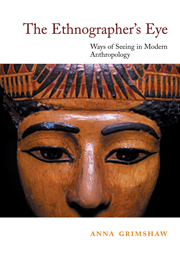Book contents
- Frontmatter
- Contents
- Preface
- Acknowledgements
- Introduction
- Part I Visualizing anthropology
- 1 The modernist moment and after, 1895–1945
- 2 Anxious visions: Rivers, Cubism and anthropological modernism
- 3 The innocent eye: Flaherty, Malinowski and the romantic quest
- 4 The light of reason: John Grierson, Radcliffe-Brown and the enlightenment project
- Part II Anthropological visions
- Epilogue
- Notes
- Index
2 - Anxious visions: Rivers, Cubism and anthropological modernism
Published online by Cambridge University Press: 05 June 2012
- Frontmatter
- Contents
- Preface
- Acknowledgements
- Introduction
- Part I Visualizing anthropology
- 1 The modernist moment and after, 1895–1945
- 2 Anxious visions: Rivers, Cubism and anthropological modernism
- 3 The innocent eye: Flaherty, Malinowski and the romantic quest
- 4 The light of reason: John Grierson, Radcliffe-Brown and the enlightenment project
- Part II Anthropological visions
- Epilogue
- Notes
- Index
Summary
The more horrifying this world becomes (as it is these days) the more art becomes abstract; while a world at peace produces realistic art.
Paul Klee, 1915The emergence of anthropology as a twentieth-century project was influenced by the work of W.H.R. Rivers, perhaps the most interesting member of Haddon's team of scientists who left Cambridge for the Torres Straits islands in 1898. Despite his importance, Rivers has until recently remained a shadowy figure in the intellectual histories of the discipline. The ambivalence which surrounds his contribution to the establishment of a modern, scientific and fieldwork-based anthropology is echoed in the uncertainty associated with the work of his cinematic counterpart, D.W. Griffith. Both figures are celebrated and reviled in equal measure. The radical impulse of their work in anthropology and cinema is tempered by the continuing presence of features considered archaic, indeed deeply embarassing, to present-day practitioners. In linking Rivers at the outset to Griffith, one of the pioneers of the new cinematic form, montage, I wish to signal the kind of interpretation I intend to pursue here. What is important for our purposes in seeking to ‘visualize anthropology’ is the modernist vision which animates their work.
The essay which follows is exploratory and speculative. I make no apology for the idiosyncratic range of sources upon which I draw; rather I take as my model the spirit of experimentation which marks the modernist moment itself.
- Type
- Chapter
- Information
- The Ethnographer's EyeWays of Seeing in Anthropology, pp. 32 - 43Publisher: Cambridge University PressPrint publication year: 2001



